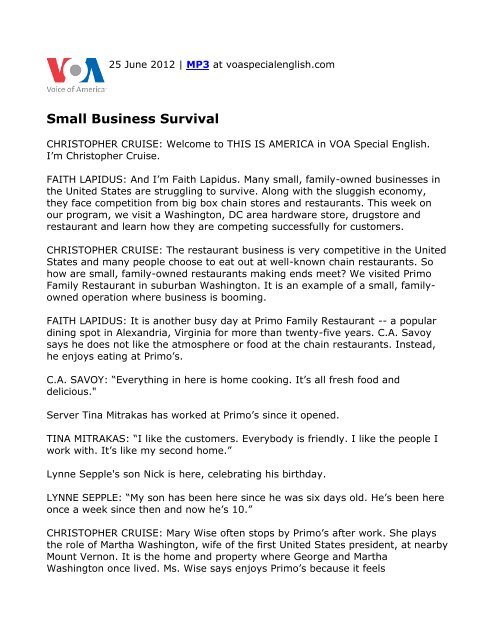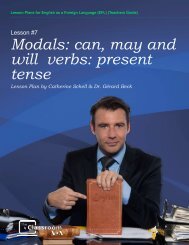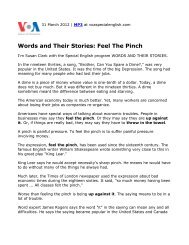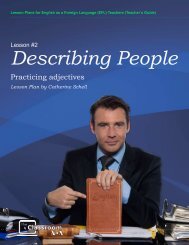Small Business Survival
Small Business Survival
Small Business Survival
Create successful ePaper yourself
Turn your PDF publications into a flip-book with our unique Google optimized e-Paper software.
25 June 2012 | MP3 at voaspecialenglish.com<br />
<strong>Small</strong> <strong>Business</strong> <strong>Survival</strong><br />
CHRISTOPHER CRUISE: Welcome to THIS IS AMERICA in VOA Special English.<br />
I’m Christopher Cruise.<br />
FAITH LAPIDUS: And I’m Faith Lapidus. Many small, family-owned businesses in<br />
the United States are struggling to survive. Along with the sluggish economy,<br />
they face competition from big box chain stores and restaurants. This week on<br />
our program, we visit a Washington, DC area hardware store, drugstore and<br />
restaurant and learn how they are competing successfully for customers.<br />
CHRISTOPHER CRUISE: The restaurant business is very competitive in the United<br />
States and many people choose to eat out at well-known chain restaurants. So<br />
how are small, family-owned restaurants making ends meet? We visited Primo<br />
Family Restaurant in suburban Washington. It is an example of a small, familyowned<br />
operation where business is booming.<br />
FAITH LAPIDUS: It is another busy day at Primo Family Restaurant -- a popular<br />
dining spot in Alexandria, Virginia for more than twenty-five years. C.A. Savoy<br />
says he does not like the atmosphere or food at the chain restaurants. Instead,<br />
he enjoys eating at Primo’s.<br />
C.A. SAVOY: “Everything in here is home cooking. It’s all fresh food and<br />
delicious."<br />
Server Tina Mitrakas has worked at Primo’s since it opened.<br />
TINA MITRAKAS: “I like the customers. Everybody is friendly. I like the people I<br />
work with. It’s like my second home.”<br />
Lynne Sepple's son Nick is here, celebrating his birthday.<br />
LYNNE SEPPLE: “My son has been here since he was six days old. He’s been here<br />
once a week since then and now he’s 10.”<br />
CHRISTOPHER CRUISE: Mary Wise often stops by Primo’s after work. She plays<br />
the role of Martha Washington, wife of the first United States president, at nearby<br />
Mount Vernon. It is the home and property where George and Martha<br />
Washington once lived. Ms. Wise says enjoys Primo’s because it feels
comfortable.<br />
MARY WISE: “It is a place where you can consistently have good food, not too<br />
expensive. You know you’re never going to be confronted with something that’s a<br />
surprise. I think people like that.”<br />
Another appeal, she says, is owner Jim Nicopoulos.<br />
JIM NICOPOULOS: “I like to get involved with my clients. I find out about them. I<br />
touch them. I have to be involved with my customers and my staff at the same<br />
time.”<br />
Everyone calls him Jimmy, including Mr. Savoy and his wife, who are long-time<br />
customers.<br />
C.A. SAVOY: “We’ve become part of Jimmy’s family now. He refers to Joyce and I<br />
as his mother and father.”<br />
FAITH LAPIDUS: Jimmy bought Primo Family Restaurant five years ago. It is truly<br />
a family business - from the photos on the wall, to the dining area, where his<br />
father-in-law seats patrons. And in the kitchen, Jimmy’s cousin Spiro Routoulas<br />
prepares Greek specialties.<br />
SPIRO ROUTOULAS: “He’s a funny guy. He comes inside the kitchen and tastes<br />
what I make. Oh, it’s fun.”<br />
JIM NICOPOULOS: “It’s quality control, Greek-style.”<br />
Besides the food and friendliness, Jimmy says Primo’s has another appeal over<br />
the chain restaurants.<br />
JIMMY NICOPOULOS: “Chain restaurants have to go through a process of buying<br />
their food from large industries and distributors. We can get our produce local<br />
and our meats.”<br />
CHRISTOPHER CRUISE: Elizabeth Bessel notices the difference and stays away<br />
from the nearby chains.<br />
ELIZABETH BESSEL: “I don’t find the food to be that great. When I eat here,<br />
Jimmy will come to the table and tell us that he got that produce from<br />
somebody’s farm.”<br />
Jimmy says he thinks there is room in the neighborhood for both family and chain<br />
restaurants. His customers agree.<br />
2
C.A. SAVOY: “It’s been here for twenty-five years and I see it being here for<br />
twenty-five more years.”<br />
FAITH LAPIDUS: One hundred years ago, Morgan Pharmacy opened its doors in<br />
Washington. Through economic ups and downs, the small, family-owned<br />
pharmacy has thrived. But how is it staying in business today with a larger<br />
drugstore just down the street? In the second part of our program on the survival<br />
of small businesses in the United States, we learn what Morgan Pharmacy is<br />
doing to keep its doors open.<br />
CHRISTOPHER CRUISE: Morgan Pharmacy has an old fashioned feel, with a<br />
display of old prescription bottles and the original shelves from when the store<br />
opened nineteen twelve. Pharmacist Barry Deutschman bought the store twenty<br />
years ago.<br />
BARRY DEUTSCHMAN: "During the time period between then, and the time we<br />
stopped carrying tobacco, you can see people would rest their cigarettes on<br />
counter here."<br />
The pharmacy is located in a residential neighborhood of Washington and most<br />
people hear about it through word of mouth.<br />
BARRY DEUTSCHMAN: "Once somebody comes in here who’s has never been<br />
here, they love the place and they want to come back."<br />
Sandra Sugar has been coming to Morgan's for years.<br />
SANDRA SUGAR: "This has nostalgia just coming in here."<br />
Toni Stephens feels a special bond.<br />
TONI STEPHENS: "The people who work here are helpful and more like family."<br />
FAITH LAPIDUS: Some customers enjoy the new products in old fashioned<br />
packaging.<br />
CUSTOMER: "It smells so good."<br />
Others, Mr. Deutshman says, like items that are old fashioned.<br />
BARRY DEUTSCHMAN: "Grandpa's Pine Tar Soap."<br />
After prescriptions, chocolate is the big seller.<br />
3
BARRY DEUTSCHMAN: "People who take medicine occasionally need a treat and<br />
they really want good candy."<br />
CHRISTOPHER CRUISE: The number of independent pharmacies has been<br />
decreasing. The National Community Pharmacists Association says about twenty<br />
thousand exist today -- down by half from twenty years ago. They are being<br />
replaced by drug and supermarket chains, which often open up in the same<br />
neighborhood, and offer a wider selection of products.<br />
But customer Abby Griffin says the chain stores are impersonal, so she comes to<br />
Morgan's.<br />
ABBY GRIFFIN: "It's the friendliness, and you feel you trust the pharmacist, and<br />
you trust their advice."<br />
FAITH LAPIDUS: Independents like Morgan Pharmacy often provide services the<br />
chain stores do not, such as compounding certain drugs and creams by hand and<br />
delivering prescriptions. Mr. Deutshman says the pharmacists also take the time<br />
to talk with customers and get to know them.<br />
BARRY DEUTSCHMAN: "So it's more than just being the neighborhood<br />
pharmacist, it's being part of the community. You don't get treated like this in<br />
chain drug stores."<br />
Mr. Deutshman hopes Morgan Pharmacy will be around for a long time.<br />
BARRY DEUTSCHMAN: "I have the most wonderful clientele in the world. I have<br />
no plans on retiring. Our plan is to hang in there as long as we can."<br />
CHRISTOPHER CRUISE: The popularity of large home improvement stores in the<br />
United States has made many neighborhood hardware stores a memory. But one<br />
family-owned hardware store near Washington is beating the odds and business<br />
is better than ever. Next we take you to a hardware store that has been around<br />
for more than one hundred years.<br />
FAITH LAPIDUS: Welcome to Browns Hardware in Falls Church, Virginia, where<br />
you can find a wide variety of hardware and other items. Browns brings back<br />
memories for customer Dennis Kraft.<br />
DENNIS KRAFT: “The thing that reminds me of the stores when I was in as a kid<br />
is that the shelves are stacked to the ceiling.”<br />
Hugh Brown has owned the store for more than fifty years.<br />
4
DENNIS KRAFT: “Hi, Mr. Brown. How are you?”<br />
Everyone calls him Mr. Brown, even John Taylor, the store manager for fifteen<br />
years.<br />
JOHN TAYLOR: “He's a great guy to work for. It's almost like working with your<br />
dad.”<br />
At eighty-three years old, Mr. Brown is the third generation to run this family<br />
business. It was founded by his grandfather in the late eighteen hundreds, then<br />
handed down to Mr. Brown's father.<br />
CHRISTOPHER CRUISE: The current store, built in the nineteen fifties, has kept<br />
its old gumball machines. And Mr. Brown still uses his grandfather's safe.<br />
He thinks the store has been successful because the customers come first.<br />
HUGH BROWN: “We try to take care of them when they come in. Try to have the<br />
merchandise that they want.”<br />
Bobbi Beck has been coming in for thirty years to buy items for her jewelry<br />
business called “Hard Wear.”<br />
BOBBI BECK: “The people who work here are like family to me.”<br />
Mr. Taylor says customers keep coming back because they trust Browns.<br />
JOHN TAYLOR: “They know we won't sell them something that they don't need.<br />
Some people will come in and talk to us for twenty and thirty minutes after a sale<br />
if we're not busy. We have a good time.”<br />
FAITH LAPIDUS: Despite its success, this neighborhood landmark could<br />
disappear. Competition from large, national home improvement warehouses,<br />
known as big box stores, is driving many small hardware stores out of business.<br />
Browns' customers say they do not want that to happen here.<br />
JOHN GRAYZEL: You can find things that you can't find at a gigantic store that's<br />
ten times as big.”<br />
SHIRLEY STREET: “You can always find someone to help you here, and someone<br />
who knows what you need. It's a personal touch and you cannot find that at a big<br />
box store.”<br />
5
CHRISTOPHER CRUISE: Many big box stores also do not provide services like<br />
fixing screens. And instead of having to buy a box of nails at the big box stores,<br />
Mr. Brown sells individual nails that are weighed on a scale made in nineteen<br />
twelve.<br />
HUGH BROWN: “They just want a few, and they love to come back here, and pick<br />
out what they want."<br />
The store also carries soap that Mr. Brown remembers from his youth.<br />
HUGH BROWN: “There's no perfume in it or anything. It's just a heavy laundry<br />
soap.”<br />
Mr. Taylor says some people come in just to look around, and find unusual items<br />
like an owl that scares birds out of gardens.<br />
And this fly zapper.<br />
With no family of his own, Mr. Brown plans to pass the store on to Mr. Taylor.<br />
When that happens, a new family tradition may begin.<br />
JOHN TAYLOR: “My son works here. He's been working here since he was in high<br />
school.”<br />
FAITH LAPIDUS: Our program was produced by Brianna Blake, with reporting by<br />
Deborah Block. I'm Faith Lapidus.<br />
CHRISTOPHER CRUISE: And I'm Christopher Cruise. You can find videos about<br />
today’s program on our website, voaspecialenglish.com. You can also find<br />
transcripts and MP3s of our programs, along with podcasts and activities for<br />
learning English. Join us again next week for THIS IS AMERICA in VOA Special<br />
English.<br />
6






